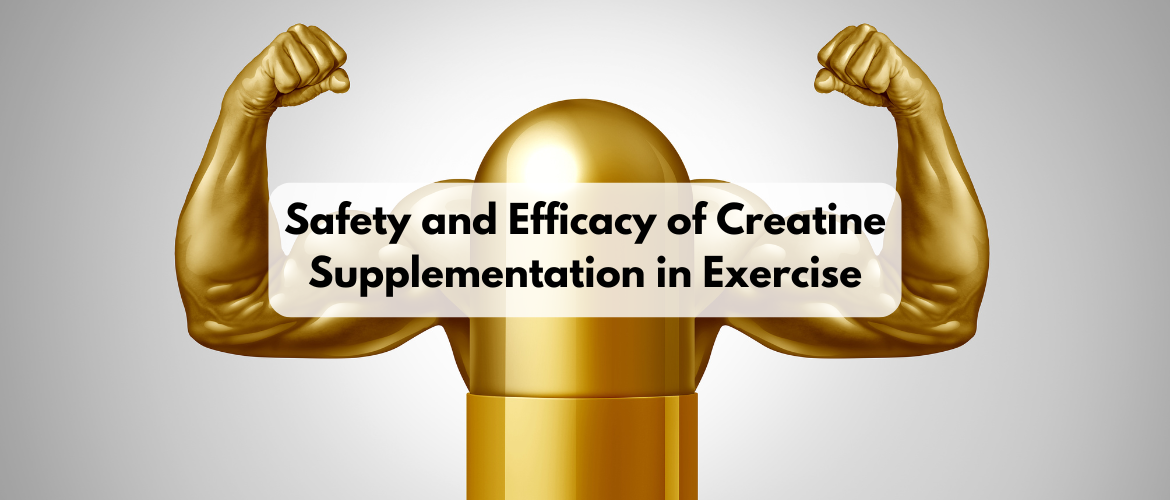No products in the cart.
Safety and Efficacy of Creatine Supplementation in Exercise

Introduction
Creatine supplementation has long been regarded as one of the most effective and widely researched performance-enhancing supplements for exercise and athletic training. Whether used by bodybuilders, endurance athletes, or casual gym-goers, creatine is praised for its ability to improve strength, power output, recovery, and muscle growth. However, many individuals question its safety, long-term effects, and optimal usage.
This guide explores the science behind creatine supplementation, its benefits, safety profile, potential side effects, and how to use it effectively for exercise performance.
What is Creatine and How Does It Work?
Creatine is a naturally occurring compound found in muscle cells that plays a critical role in ATP (adenosine triphosphate) regeneration, the primary energy source for high-intensity exercise. While creatine is obtained from dietary sources like red meat and fish, supplementation ensures higher creatine stores in muscle tissue, allowing for improved performance in strength-based activities.
Mechanism of Action
✔ Boosts ATP production, providing rapid energy for short bursts of exercise.
✔ Increases muscle hydration, supporting volume and recovery.
✔ Enhances workload capacity, allowing athletes to train harder and longer.
Due to its ability to increase energy availability during workouts, creatine is particularly beneficial for weightlifting, sprinting, HIIT training, and explosive movements.
Efficacy of Creatine Supplementation for Exercise Performance
1. Strength and Power Enhancement
Creatine supplementation has consistently been shown to improve strength and power output, making it a staple for resistance training athletes. Studies indicate:
✔ Increased one-rep max strength in compound lifts like bench press and squats.
✔ Improved sprinting performance, particularly in short-duration explosive activities.
✔ Greater force production, leading to better endurance in strength-based exercises.
For those aiming to increase muscle power and athletic ability, creatine is one of the most effective supplements available.
2. Faster Recovery and Reduced Fatigue
Post-exercise recovery is crucial in preventing injury and optimizing performance. Creatine helps by:
✔ Reducing muscle damage, preventing excessive soreness.
✔ Enhancing glycogen resynthesis, ensuring muscles recover quickly.
✔ Lowering inflammation markers, aiding faster rehabilitation between workouts.
Many athletes use creatine for recovery support, allowing them to train harder with less downtime between sessions.
3. Lean Muscle Mass Growth
One of creatine’s biggest benefits is supporting lean muscle development. It helps:
✔ Increase muscle hydration, giving muscles a fuller appearance.
✔ Enhance protein synthesis, leading to greater muscle fiber growth.
✔ Promote long-term muscle hypertrophy, especially in strength training.
Those looking to build muscle efficiently while maintaining strength often use creatine supplementation as part of their routine.
4. Cognitive and Neurological Benefits
Beyond exercise, creatine has positive effects on brain health and cognitive function. Studies indicate its ability to:
✔ Improve mental clarity and focus, particularly during intense training sessions.
✔ Enhance neuroprotection, supporting brain function in aging individuals.
✔ Reduce cognitive fatigue, assisting in mental endurance.
For individuals juggling work, training, and mental performance, creatine supplementation offers broad-ranging benefits beyond just muscle enhancement.
Safety of Creatine Supplementation
1. Is Creatine Safe for Long-Term Use?
Creatine is one of the most extensively studied supplements, and research consistently supports its long-term safety. No significant harmful effects have been reported among healthy individuals taking recommended doses.
✔ No evidence suggests kidney or liver damage in healthy users.
✔ No negative effects on hydration balance, contrary to myths about dehydration.
✔ Well-tolerated in clinical trials, with no major adverse health concerns.
2. Common Side Effects and How to Avoid Them
While creatine is safe for most individuals, some may experience minor side effects, including:
✔ Mild water retention – Muscles store extra water, leading to slight bloating initially.
✔ Digestive discomfort – Occurs in some users when taking excessive doses; resolving with proper hydration.
✔ Increased body weight – Temporary gain due to muscle hydration, not fat accumulation.
Most side effects are minimal and temporary, especially when proper dosing and hydration are followed.
3. Does Creatine Affect Kidney Function?
One of the most common concerns surrounding creatine is its impact on kidney function. However, scientific research has repeatedly confirmed:
✔ Creatine does not cause kidney damage in healthy individuals.
✔ Those with pre-existing kidney disease should consult a physician before use.
✔ Proper hydration supports safe creatine metabolism, ensuring no excessive strain on the kidneys.
For healthy individuals, creatine poses no renal risk, making it a safe long-term supplement for performance enhancement.
Best Practices for Creatine Supplementation
1. Optimal Dosage Guidelines
✔ Loading Phase (Optional): 20 grams per day (split into 4 doses) for 5–7 days to saturate muscles faster.
✔ Maintenance Dose: 3–5 grams daily for consistent benefits over time.
✔ Post-Workout Use: Taking creatine after workouts may help with muscle recovery and glycogen replenishment.
2. Best Time to Take Creatine
✔ Pre-Workout: Provides energy support for strength training.
✔ Post-Workout: Aids muscle recovery and ATP regeneration.
✔ Daily Use: Regular supplementation ensures optimal muscle creatine levels.
3. Hydration and Creatine Absorption
✔ Drink plenty of water while using creatine to avoid digestive discomfort.
✔ Combine creatine with carbohydrates to improve uptake into muscle tissue.
✔ Ensure proper electrolyte balance, especially during intense workouts.
Frequently Asked Questions
Q: Is creatine safe for daily use?
A: Yes! Research supports long-term creatine use with no adverse effects when taken at recommended dosages.
Q: Does creatine cause bloating or dehydration?
A: Creatine increases muscle hydration, but does not cause dehydration if proper fluid intake is maintained.
Q: Should I cycle creatine supplementation?
A: No cycling is needed—creatine can be taken continuously for consistent benefits without negative effects.
Q: Does creatine work for endurance athletes?
A: While creatine primarily benefits power-based activities, it can help endurance athletes recover faster and maintain glycogen stores longer.
Q: Can women take creatine?
A: Absolutely! Creatine benefits both men and women, supporting strength, recovery, and muscle hydration.
Conclusion
Creatine supplementation is one of the safest and most effective ways to enhance exercise performance, muscle strength, recovery, and cognitive function. It is backed by extensive scientific research, proving its long-term safety and efficacy for various athletic needs.
By incorporating proper dosage, hydration, and timing, individuals can experience significant benefits without adverse effects—making creatine an essential tool for fitness enthusiasts, athletes, and professionals alike.
Ready to elevate your exercise performance? Start supplementing with creatine today! 💪🚀
Start your wellness journey today — Visit Unike Nutra Now
Follow us
Facebook – https://www.facebook.com/profile.php?id=61567462823245
Instagram – https://www.instagram.com/unikenutra/
Twitter – https://x.com/Unikenutra
LinkedIn: https://www.linkedin.com/company/unike-nutra/
Amazon: https://www.amazon.com/stores/UnikeNutra/






